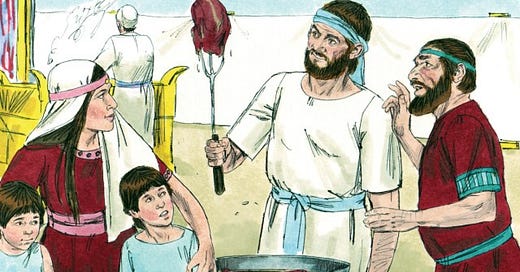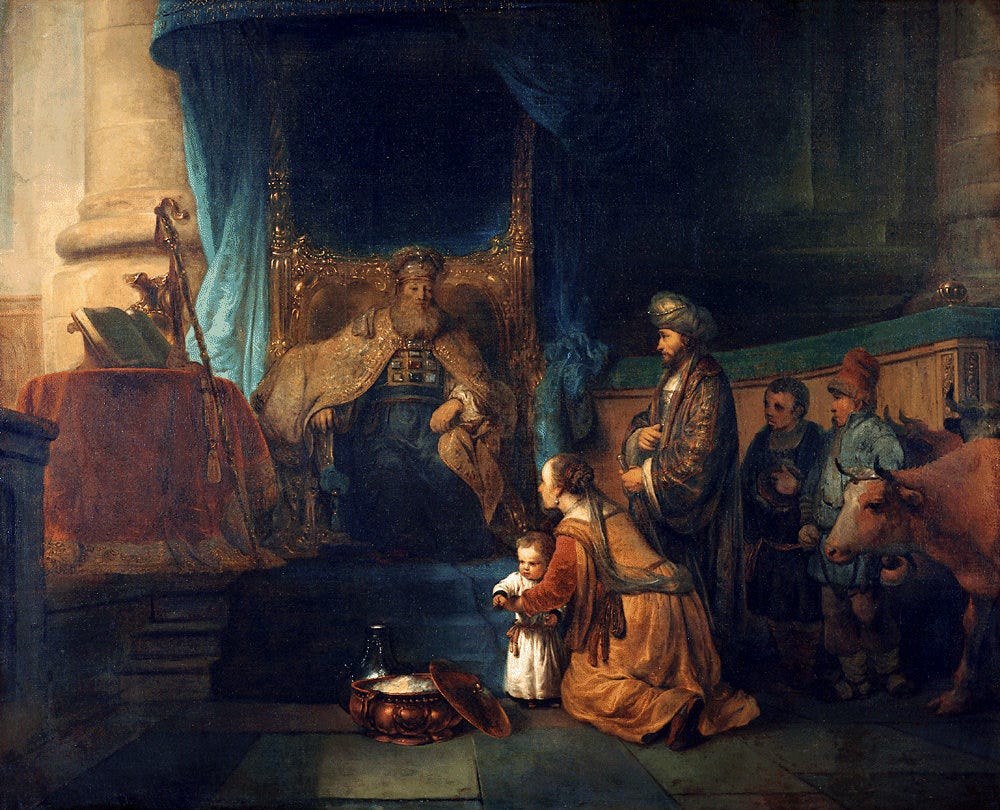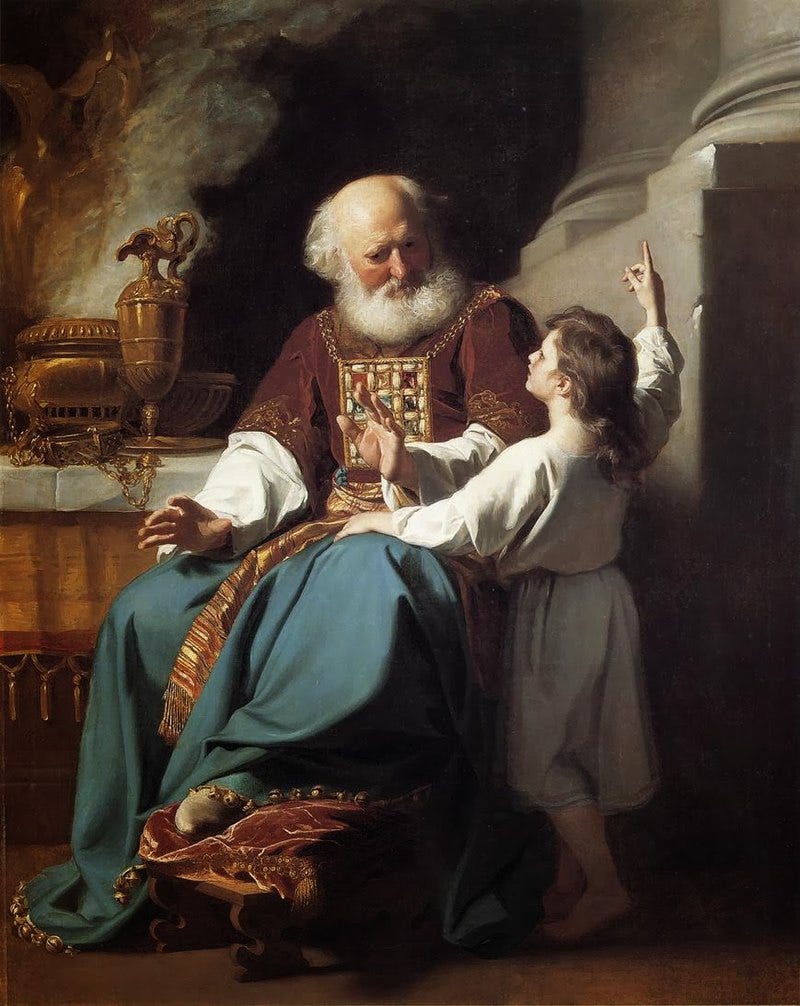Tell us, oh prophet, of powerful men. Speak of their origins and downfalls, but don’t skimp on the weird stuff—their appetites, pleasures, kinks. Show how these men were undone by their inadequacies. Show how the seeds of loss were sown in each victory. And make it fabulous.
We want to hear of David, the man who learned too-well the costs of creeping around on rooftops. Warrior, poet, lover, father, killer—you can’t tell where his virtues stop and vices begin. Please tell us more about this guy.
Before him came Saul. Saul felt people were out to get him, and boy oh boy was he right. He was haunted by ghosts, among others. That’s wicked cool, tell us about Saul and tell us about those ghosts.
And what about the man who crowned both David and Saul? That would be Samuel. It’s his book after all—how did his name get on the marquee? What’s his role in this circus?
That’s a good one too. Get to it, oh prophet.
• • •
Eli the Priest, along with his sons Hophni and Pinchas, runs the temple in Shiloh. Eli is getting older, and his sons are grown. Eli has made it no secret that, when the time comes, he wants the boys to run the temple in his stead. There are others, however, who think that this plan is absolutely nuts. Eli, however has not wavered.
The way Eli sees things, each year more and more people arrive at Shiloh—Israel’s population is growing, is the point. This is a people with no ruler, no government, no collective military. Along the coast live the Philistines, and soon (not yet) Israel will grow numerous enough to give them trouble. Who will lead the charge? Somebody. Somebody from the priesthood, thinks Eli, close to God. My sons will take my place.
But Eli, come on! Your sons are…perhaps…better suited for…what I mean is…
Well. Let’s put it like this.
Many sorts of people arrive at Shiloh to worship. The youth who returned safely from sea and wishes to slaughter a calf in gratitude. The husband who sinned grievously and wants to expiate his guilt. The woman, needful of medical attention, whose local priest instead prescribed a grain offering. All bring sacrifices to the Lord.
Hophni and Pinchas are in charge of the sacrifices. Boy, do they love sacrifices.
Any animal brought into the temple is declared sacred. If it is without a blemish, the animal is slaughtered and cleaned, then fed to the flames. The fires reduce it to sweet smoke. The smoke rises to heaven and the malady is healed, the husband is forgiven, your offering is complete.
But while the fires are first licking the flesh, along come Assistants to the Temple Manager Hophni and Pinchas. Hophni has a huge trident. The brothers smile and say hi, then shove the trident into the sacrificial fire. Out of the flames comes a fatty piece of lamb, beef, goat, whatever’s on the menu. The brothers drop the sacred meat in a bucket and head to their private dining room for brunch.
The priests of Shiloh do not like that Hophni and Pinchas are doing this.
Then there’s the thing with the women. Women also bring sacrifices. Hophni and Pinchas tell these ladies, you’ve brought a wonderful goat. The Lord’s going to love this goat. Especially if we use the choiciest ingredients and bring the sacrifice at the best time—which we would be glad to do! Especially for such a beautiful girl such as yourself.
Then they’ll subtly suggest that there’s another offering that they might want to give up.
In Pinchas and Hophni’s private quarters.
It’s sex.
The offering is sex.
You probably didn’t need me to spell that out. Sorry.
But, yes, sex. Hophni and Pinchas are shtupping the pious, sacrifice-bearing ladies of Israel. And so despite his points about the political headwinds in Israel, not everyone is in favor of Eli’s succession plan. And no one is completely sure how much of all this stuff with his sons Eli is aware of.
One day, a certain woman is standing outside the temple. She whispers against the walls, wet tears gushing from her eyes like blood from a wound. Hophni and Pinchas see her and trade glances with arched eyebrows that in their brospeak means “agreed, let us not bother this lady, as probably she won’t be very much excited for sex or our famous goat tacos.”
She stands outside the temple all day, whispering and crying.
Someone alerts Eli to her presence. Eli takes in the woman muttering to herself with eyes closed. He sighs. Every temple seems to attract drunks and fools.
Eli marches over to the woman and tells her to scram. Get out of Shiloh, you drunk!
But my master, she says, where else should I go. Is this not a temple?
Eli is taken aback. He is instantly apologetic, he just hadn’t realized. He asks the woman for her name. It turns out she is Hannah, and is praying for a child.
She has a husband and a sister wife, and the sister wife is popping out babies like, woah. It’s almost too many babies. On top of that, Ms. Fertile won’t stop mocking Hannah for her failure to conceive, and this makes Hannah feel like her insides have been scooped out and trampled over with boots.
Hannah’s husband professes his love, but love only gets you so far. She needs a child.
By way of apology for so badly misjudging her, Eli offers a blessing that her prayers will be answered. And late that night, back home, Hannah and her husband have very pious sex in the missionary position. Nine months later, a son is born.
The boy’s name is Samuel.
When Samuel turns two, Hannah returns to the temple. After introducing her boy to Eli, Hannah announces that earlier she had made a vow: if she conceived a son, he would serve at the temple in Shiloh. The boy, in a sense, would be her own offering.
Eli is charmed and agrees to raise the boy in Shiloh. One of the women will care for Samuel, and when ready he will serve Eli himself.
Samuel moves to the temple. It’s his first night in Shiloh, and he settles in right away. Meanwhile, Hophni and Pinchas can be found in their private quarters, dangling the fatty part of a burnt offering directly over the belly of a well-proportioned worshipper, thanking God for their great fortune.
Years pass. Samuel’s mother visits at the same time each year and brings a coat that will last the winter. Each year she guesses as to how much he has grown, but Samuel wears the coat even when the fit is wrong. Eli has grown older too, and Samuel now attends to his needs more closely. He sleeps just down the hall from the high priest of Shiloh. One night he is woken by a voice.
Samuel, the voice says.
The boy takes it to be Eli. He runs to Eli’s quarters, but Eli rolls over and tells the boy to go back to sleep. Samuel returns to bed.
Samuel, the voice says again.
The boy runs into Eli’s quarters. Go away, he tells him. If you are having a bad dream, just go do that on your own. I am going back to sleep now. And Eli did, and Samuel went back to his room.
SAMUEL, the voice says. SAMUEL.
And still, Samuel doesn’t get it. Then again there hadn’t been prophecy for years and years. Everything lately had been judges and priests, nary a prophet to speak of. But a lot of things were changing in Israel, and this was changing too. Prophecy is back, baby.
Give Eli credit, he understands exactly what’s going on. When Samuel runs back into his master’s room, Eli tells him that he has to listen to that voice. For whatever reason, the voice has chosen him to deliver a message. There’s only one choice to make, and it’s not really even a choice. Go back to your room, Samuel.
SAMUEL, the voice says when he returns to bed. OH GOOD, YOU’RE HERE. THAT’S TERRIFIC. I HAVE SOMETHING VERY IMPORTANT TO TELL YOU.
The boy says nothing.
WELL, ARE YOU READY?
Sure, says Samuel.
ALL RIGHT, says the voice. HERE’S WHAT I’VE GOT TO SAY. ELI’S SONS ARE THE WORST. I HATE THOSE IDIOTS. I HATE THEM SO MUCH. THAT’S BASICALLY ALL FOR NOW. I’LL BE IN TOUCH WHEN I HAVE FURTHER DETAILS. YOU THINK YOU’VE GOT THAT?
Sure, Samuel says.
THAT’S FANTASTIC. LOOKING FORWARD TO WORKING WITH YOU ON FUTURE PROJECTS. ALL THE BEST.
And then the voice was gone, and Samuel was overtaken with sleep.
• • •
In the morning, Eli waits for Samuel. Tell me what the voice said, says Eli.
Uhh, says Samuel. I forgot.
No you didn’t. I know the old stories, there is not a single case of a prophet just sort of forgetting the prophecy. Tell me what the voice said, boy.
You promise I won’t get in trouble?, says Samuel.
I swear to you, boy, that if you don’t tell me the prophecy right I will march you up that altar and personally slaughter you to the Lord. That’s the trouble you should be worried about. Start talking.
Samuel looked down at his feet as if he were searching for a way to escape down through the dirt. Then, after a few moments of silent squirming, he met Eli’s gaze directly. His face had changed. He was now completely embodying a righteous anger, mostly in the eyes.
YOUR SONS ARE THE WORST, said Samuel, GOD HATES THEM, AND THOSE THAT GOD HATES AND THOSE WHO PROTECT THEM WILL EXPERIENCE A SWIFT AND SPECTACULAR DOWNFALL. IT IS TOO LATE FOR THE HOUSE OF ELI. HE IS COMING AND SOONER THAN YOU THINK.
Eli stared at the boy. In a sense he had raised him. He had held him on his knee. He had at times kissed him on the forehead when he fell. He had brought him close so that he would learn. He had owed as much to the boy’s mother. He had loved the boy, maybe not as much as his own sons, but as much as he could.
The boy, his words spoken, looked again at the floor. But a touch of rage still marked his face.
Samuel, said the priest. Listen to me. He is the Lord. He will do what he deems right.
And Eli walked away, leaving Samuel alone with this one last lesson.
• • •
His master gone, Samuel went about his morning duties.
The temple was now humming with activity as the morning offerings were brought. In the inner sanctum, the menorah was lit and incense was burnt. Nobody went into the innermost sanctuary, where the ark sat all by itself.
In their quarters, Hophni and Pinchas rolled over and smiled at each other, excited to live out another glorious day of service to their Lord.
And beyond them, even beyond Shiloh, Israelites left their homes to tend to their sheep, farms, kilns and shops. They traded and purchased in the markets. Their disputes were settled by scribes and clansmen, military leaders and judges. They built new homes on hilltops, poured oil on fresh altars, made marriage pacts, told tales of floods, rivalries, plagues, and wars. They traveled between towns and trampled fresh paths. These people were restless. Along the sea lived the Philistines in five cities, already properly civilized. This is Israel’s growth spurt. Things were changing fast.
But Eli sat alone in his chair, in his temple. He knew something was coming. It was a new day, but he was already exhausted.







This stuff is so good.
Michael: it will help increase appreciation if you explain how you come up with this stuff. Is it fair and accurate to say that you read the original texts closely, that you then improvise based on phrases that trigger your fanciful extensions, far enough to be entertaining as satirical interpretation, but still close enough to what is implied in the text to resound deeply? You then find (how I cannot imagine) illustrations that illustrate your story. If yes, that's more or less what you are up to, then you have shown that you cannot make this stuff up.
I'm on the edge of my seat waiting for the next installment!